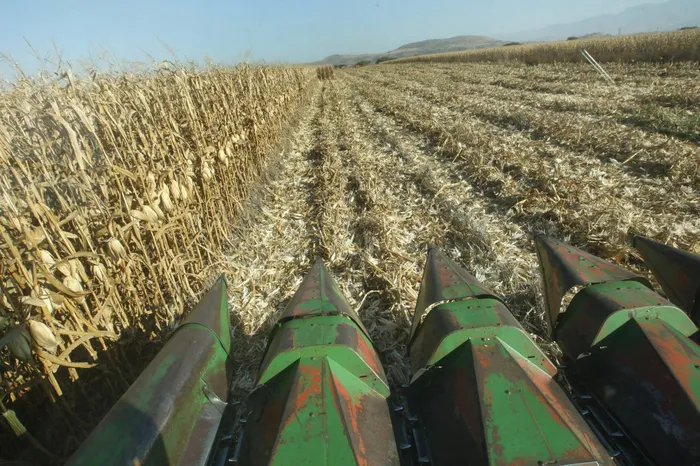Food prices expect to cool ahead but farmers keep eye on weather

The good news is that South Africa has experienced another favourable cropping season and the 2022/2023 maize harvest stands at 16.4 million tons. File
As South Africa hopes for food prices to cool towards the end of the year, agricultural experts say the weather ahead will be the deciding factor.
This week Statistics South Africa, released data which showed the country’s consumer food inflation slightly slowed to 8% in September.
The Agricultural Business Chamber (Agbiz) chief economist Wandile Sihlobo said this week the organisation was optimistic about food prices easing despite renewed risks in global agriculture.
Projected weather patterns impact food inflation as South Africa approaches the end of this year, according to Thabile Nkunjana, the senior economist at the Trade Research Unit of the Markets and Economic Research Division in the National Agricultural Marketing Council (Namc).
Nkunjana told Business Report weather effects crop yields and, ultimately, food prices.
John Hudson, Nedbank head for Agriculture said while geopolitical tension and renewed risks in global agriculture were creating uncertainty and while South Africa faced its own challenges such as load shedding, rising interest rates, high diesel costs and disease concerns this made it tricky to predict food prices going forward.
“The good news is that South Africa has experienced another favourable cropping season and the 2022/2023 maize harvest stands at 16.4 million tons, which is the second biggest crop on record and along with other field crops we expect this to contribute to the continued slowing in food inflation, albeit gradually. We are, therefore, still hopeful that consumer food inflation will continue to slow in 2023 and into 2024,” Hudson said.
According to the Department of Agriculture, Land Reform and Rural Development (Dalrrd) Climate Advisory for this Summer issued earlier this week, parts of the country are currently reporting poor to reasonable veld and livestock conditions. Dalrrd said land preparations were underway for summer crops.
It stressed that veld fires in several provinces had resulted in damage to grazing land and infrastructure, as well as contributing to livestock fatalities.
“Assessments are being conducted by provinces to quantify the damage. Farmers are being advised to be on the lookout for daily extreme weather warnings and implement risk-reduction measures. The average level of major dams remains high with most provinces, above 80%.”
According to the Seasonal Climate Watch issued by the South African Weather Service (SAWS) earlier this month, above normal rainfall was anticipated for large parts of the country during the early part of summer.
Below normal rainfall was expected during mid-summer over the western and central parts of the country as predictions still favoured above normal rainfall conditions over the north-eastern parts of the country during mid-summer, even with an El Niño in place.
SAWS further cautions that the El Niño effect might still manifest its influence over the next few months and change the outlook of the rainfall forecast for mid-and late summer. Both minimum and maximum temperatures were expected to be above normal countrywide.
Roelie van Reenen, supply chain executive at Beefmaster Group recently told Business Report that raging veld fires wreaked havoc on both farmers and communities, inflicting not only severe financial losses but also emotional trauma in the form of damaged infrastructure, scorched farmland, and lost livestock. He said the devastating veld fires that recently swept through much of central South Africa had a dire impact on a prime cattle region, with hundreds of thousands of hectares destroyed.
“The persistent fires pose ongoing challenges for farmers and primary producers, as they result in reduced grazing areas for herds. In turn, primary producers are likely to be forced to sell significant portions of their livestock, something that they weren’t planning on doing. This, in turn, threatens the profitability and long-term sustainability of their operations, a concern for the beef industry supply line; although the impact on the nation’s food security in the future remains uncertain,” Van Reenen said.
The company said this underscored the pressing need for collective efforts to gain control over veld fires. “It is imperative that everyone commits to implementing robust systems and procedures to effectively manage the fire risk, which includes keeping fire equipment in working order and readily available and establishing firebreaks on properties."
"We've witnessed the commendable achievements of bodies like the North West Umbrella Fire Protection Organisation, which has dedicated itself to reducing the hectarage affected by fires every year in the region. It is through such collective endeavours that we can hope to mitigate the devastating impact of veld fires."
The department said it would partner with all relevant stakeholders to continue raising awareness in the sector and capacitation of farmers on understanding, interpretation, and utilisation of early-warning information for disaster risk mitigation and response.
BUSINESS REPORT